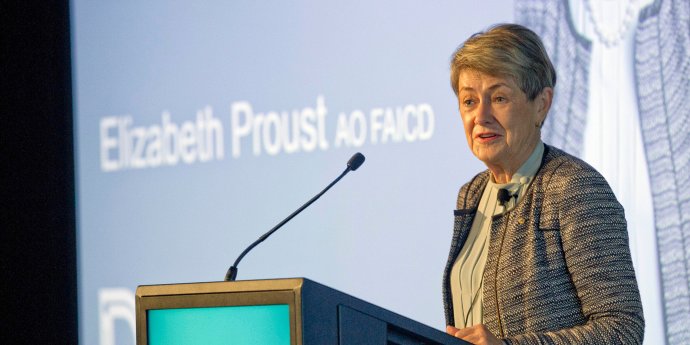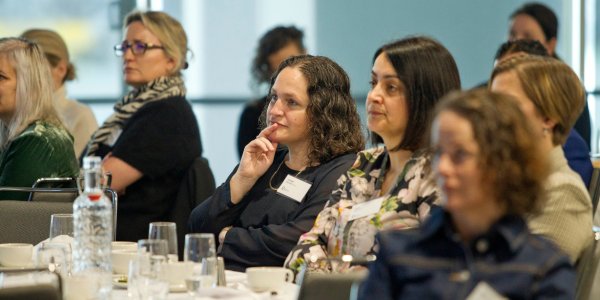Geneva-bound director sings CDC praises
Marc Rivers shares how he found the Institute of Directors Company Directors’ Course a valuable experience.

One of Australia’s leading business figures, Elizabeth Proust AO FAICD, says old boys clubs and networks still exist.
“It’s still alive and well, at least in Australia… I’m not sure why some younger men join these places, which I've always found surprising,” she told attendees at a Women Directors’ Network event held by the Institute of Directors (IoD).
Proust makes it clear – she has no interest in belonging to these clubs, regardless of the fact that other women want access to them.
“There's a club in Melbourne where a lot of energy has been spent trying to convince the members to allow women in, and they asked me to be part of it. I don't want to join it, even if it happens,” she said.
Proust believes women in leadership, including those aspiring to sit on boards, need to pick their battles.
While dragging a golf cart around with the boys isn’t necessarily off the cards, she says women need to find ways to expand their networks in order to be successful, because hard work and long hours aren't going to cut it.
“We also need to find ways to engage with the men around the board table, in our companies, in our organisations,” Proust said.
Known in Australia for seamlessly and successfully navigating her way between the public and private sectors, Proust has held high-profile government roles as Secretary (CEO) of the Department of Premier and Cabinet (Victoria), and Chief Executive of the City of Melbourne.
Eighteen years ago, she made the transition to full-time governance and, to date, has clocked up around 30 board roles. She is currently chair of Nestle Australia, chair of the Bank of Melbourne, a non-executive director of Lendlease Ltd and the immediate past chair of the Australian Institute of Company Directors (AICD), among others.
A long-time advocate for female leadership, Proust has been responsible for helping other women to get a foot-on the ladder, including identifying women for top jobs and mentoring emerging talent.
“I’ve attempted to mentor mostly women, either in my organisation or outside,” she said.
Receiving mentorship throughout her career, including in-depth insights from business leaders, including Victoria’s Premier, reinforced to her the importance of mentoring women.

Women Directors’ Network event held by the Institute of Directors.
In her earlier career, along with a group of senior women leaders, she was involved in setting up informal meetings to build a network for women.
“So we would meet once a month after work – no agenda no minutes – we would each bring a younger woman from our organisation to introduce them to others to encourage them to apply for roles.”
While working in the private sector for ANZ, Proust was also responsible for the graduate programme. Young women were feeding back about their struggles to climb the corporate ladder, gradually finding themselves trailing behind their male counterparts and being left out of all important golf days and other networking opportunities. Yet they believed that if they worked hard enough, they would eventually be noticed.
Proust was quick to put them straight: “You need to put yourself forward, you need to do some project work, don’t assume the world is fair.”
She says men in leadership positions inadvertently leave women out of the picture because of well-worn assumptions, “women aren't interested in golf” was one response she received when confronting a manager about overlooking a young female graduate to join networking events.
While that might sound laughable, this unconscious bias exists today and can become an obstacle to women getting ahead.
For women wanting board roles, Proust says there are a multitude of skills that boards can be looking for at any given time. Previously, strong financial literacy was top of the list, but the needs of boards now cross over into digital, cybersecurity, and more.
“It’s an interesting dance – what is the business today and what are the skills we need for the future?” she says of the thinking done by boards.
More importantly, she says boards will be looking for an alignment in skills base and knowledge.
Proust suggests women seek out roles that connect back to their chosen profession or other areas of expertise, at least at the start. But networking is also important – according to Proust, 30 percent of board appointments are conducted through networks and ensuring that you’re on the executive search radar.
“Certainly in the listed space in Australia. I don't think there's any advertising for the roles.”
Fortunately too, she says the boys club isn’t a factor for appointments for good boards.
For those considering making the move from executive roles to non-executive governance, Proust believes there is no right or wrong age, but cautions that it isn’t easy to turn back once you make the shift.
“Experience is learning from your mistakes… you can, in theory, go back, but […] you’re usually signalling you’re moving to another phase of life.”
She adds that it can be challenging for people to make the shift from a CEO role to making decisions as a collective on a board. CEOs make decisions and face the negative or positive consequences, whereas being on a board, according to Proust, is essentially a team sport.
“It’s a different role from being an executive… you really need to get up a level, be monitoring, asking good questions and be part of a team. It’s not full-time and you can put a number of boards together and have a very satisfying career. But make the switch when you feel that you’ve learnt enough in your executive and professional life to be able to give back, and also to be able to contribute at a strategic level to what the board needs to do.”